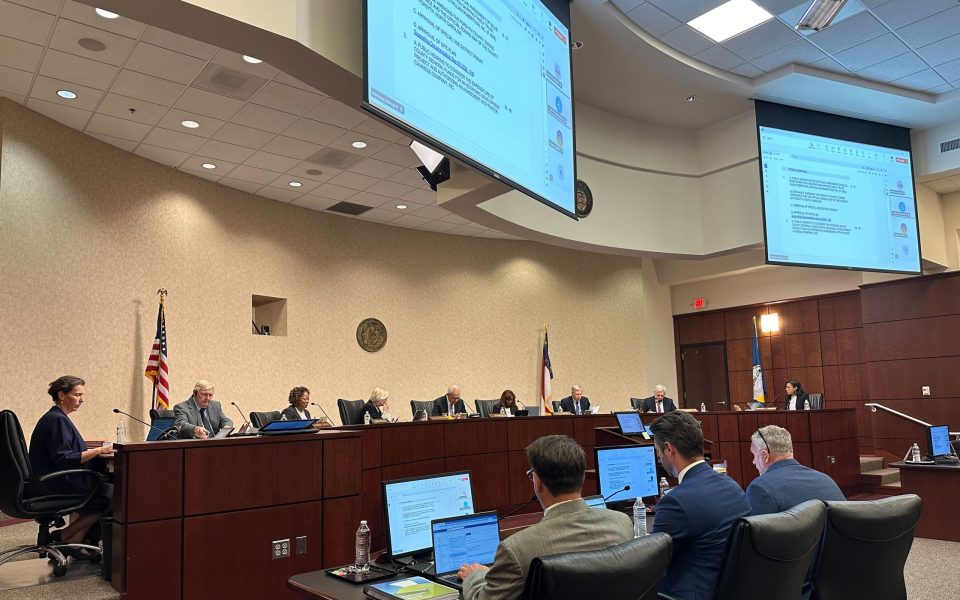Featured photo: Forsyth County’s Board of Commissioners met on Sept. 5, 2024. (Photo by Gale Melcher)
Sometimes we need a little help. Whether someone is experiencing a mental health crisis or struggling with substance use, Forsyth County has paramedics who are ready to come to the scene and cater to those specific needs. It’s called the Mobile Integrated Healthcare Program, or MIH.
Forsyth County’s Deputy County Manager Denise Price explained that in the past, the team has been behavioral health-related with “some add-on things as needed.” But now, their focus includes much more, such as responding to overdoses in the community and providing support.
This year’s budget for Behavioral Health Services was nearly $6.4 million; more than $4 million of that is allocated to providing mental health, substance use and developmental disability services. On Sept. 5, county commissioners transferred $100,000 to the pandemic response special revenue fund to be spent on the MIH team, which received $850,000 in state funding from this year’s budget.
This 24/7 team brings trained paramedic professionals to “high-risk” 911 patients, such as those refusing transport, overdose patients, patients who fall frequently and patients who have needs which cannot be addressed during the 911 call.
In addition to overdose response, they also provide people with medication for opioid use disorder.
“We can give them medication right then and there which will help them with the withdrawals while we’re connecting them with care,” Price said.
They also offer community support. If people don’t have a vehicle to get them to their behavioral health appointments, this team can directly go to them.
They also collaborate with the city of Winston-Salem’s mental health team called BEAR, which stands for Behavioral Evaluation and Response. BEAR offers an alternative to police presence and brings trained counselors to people in crisis; it’s run by Director Kristin Ryan.
“They work very, very closely together,” Price explained. “It’s a whole lot of collaboration….Sometimes, Kristin’s team can do things that we can’t.”
That’s where they can maneuver which calls they might be the best fit on.
“Both are absolutely needed,” Price said. “In fact, we could probably use six more teams, but MIH’s difference is that they’re paramedics; they have that medical piece.”
Sometimes they’ll get calls from the elderly population that can look a lot like psychosis, Price said. But instead, it’s a urinary tract infection.
“Or it’s diabetes that’s gotten out of control,” she added.
That’s where MIH can step in to do an assessment right there on site, and help direct people to the right place.
How to call?
For a behavioral health crisis, call the Mobile Crisis/Mobile Engagement Team at 1-866-275-9552. For urgent behavioral health evaluation and connection to treatment, call (336) 955-8430. Connect with a first responder to set up services and appointments by calling 1-888-235-HOPE (4673). For detox and possible short term inpatient stay, call (336) 300-8826. Visit the county’s website to learn more. Referrals are accepted from fire departments, EMS personnel, law enforcement and other community partners.
All CityBeat reporting content is made possible by a grant from the NC Local News Lab Fund, available to republish for free by any news outlet who cares to use it. Learn More ↗
Republish this storyJoin the First Amendment Society, a membership that goes directly to funding TCB‘s newsroom.
We believe that reporting can save the world.
The TCB First Amendment Society recognizes the vital role of a free, unfettered press with a bundling of local experiences designed to build community, and unique engagements with our newsroom that will help you understand, and shape, local journalism’s critical role in uplifting the people in our cities.
All revenue goes directly into the newsroom as reporters’ salaries and freelance commissions.


Leave a Reply